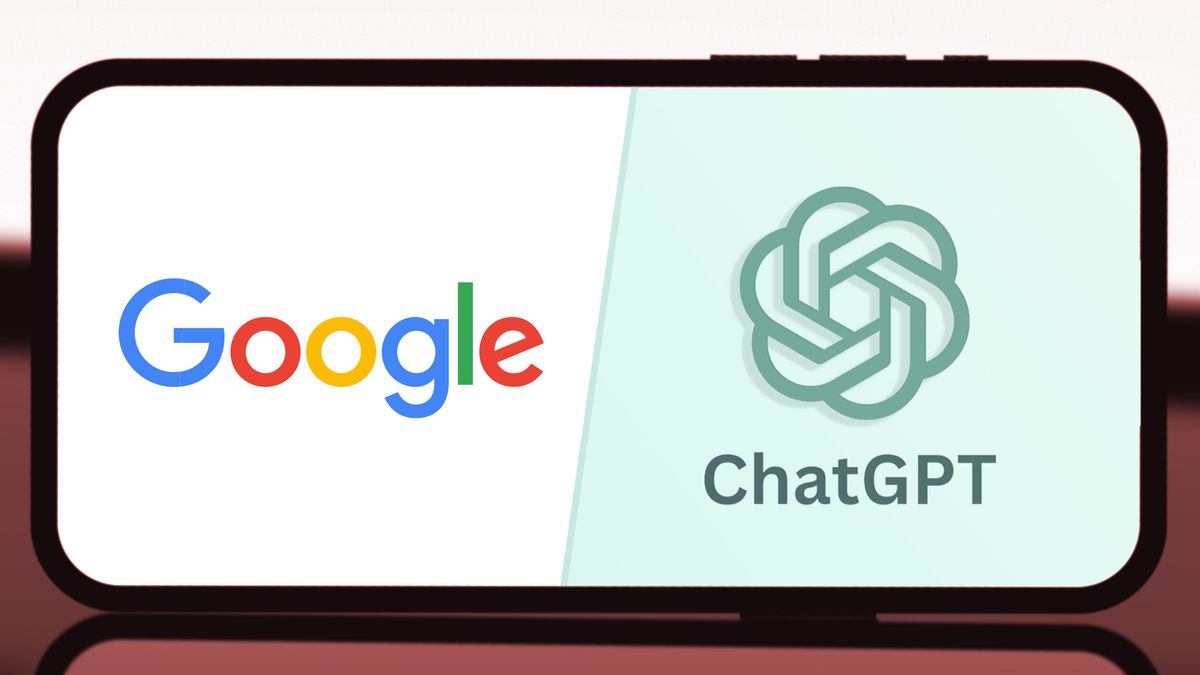With OpenAI’s new real-time search feature, ChatGPT is positioning itself as a competitor to traditional search engines like Google. Known for its conversational responses, ChatGPT delivers real-time, contextual information without ads.
I jumped at the chance to see how ChatGPT Search stacks up against Google’s long-standing expertise in search. I ran several comparisons between ChatGPT’s new feature and Google, covering categories like speed, accuracy, visuals, and overall user experience. Here’s how they performed.
1. Speed and response time
Prompt: “What are the top tourist attractions in Tokyo?”
Google: Google’s search engine is very quick and the results are delivered within milliseconds. With images and links for context, the search engine has years of optimization in its corner, and an infrastructure built specifically for high-speed indexing and retrieval. With this prompt and others, I received instant access to a wide range of relevant results across multiple sources.
ChatGPT: ChatGPT’s search was equally fast and generated images and information for each location in a much clearer, user-friendly way. It was apparent the AI generated the response by pulling from relevant sources and then shared the information in a conversational answer. The results felt friendlier, almost as if the AI is excited for me to take a trip.
Winner: ChatGPT Search takes the lead for a valuable, speedy response delivered in a conversational, yet concise way.
2. Quality of information and accuracy
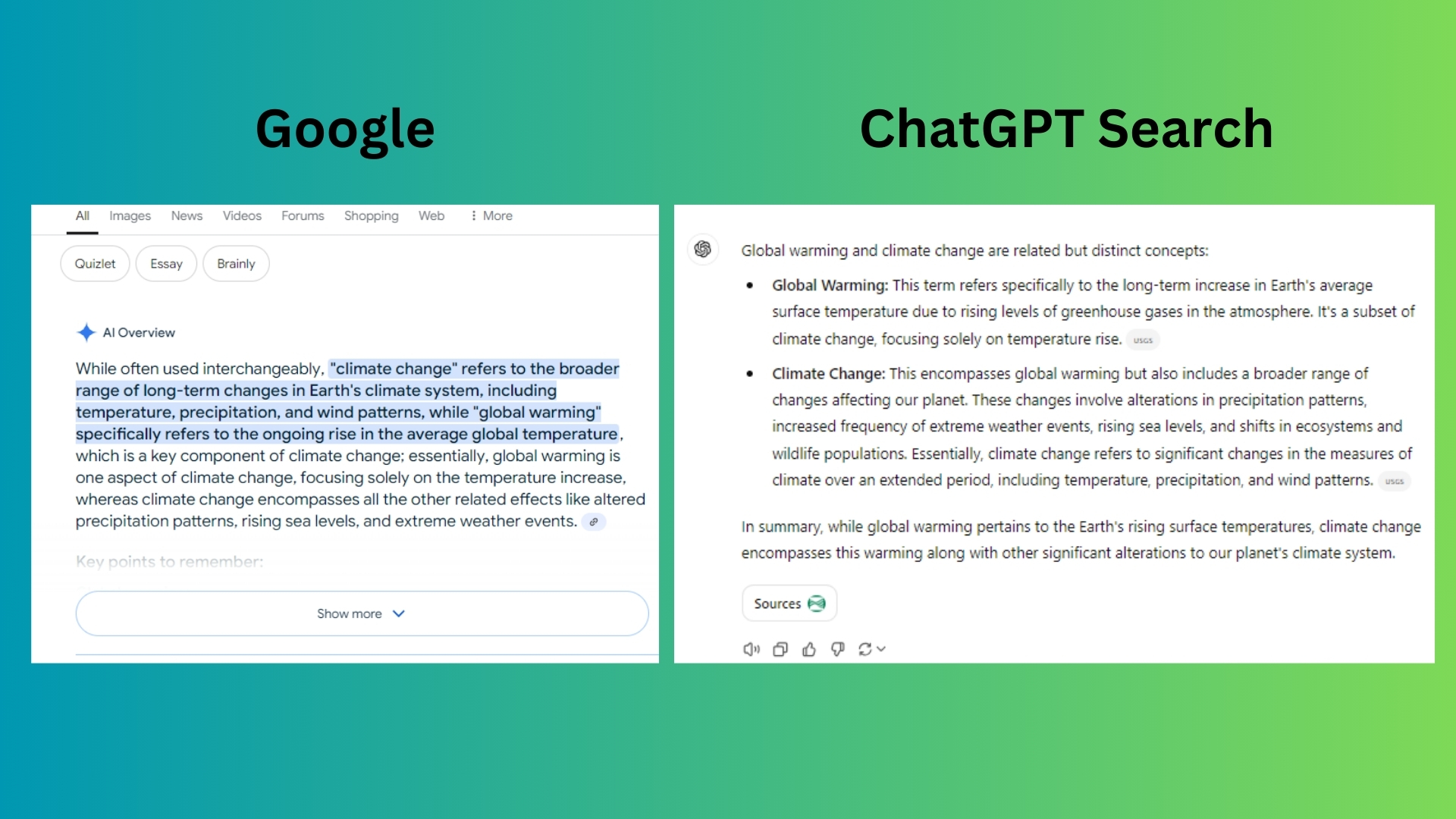
Prompt: “Explain the differences between climate change and global warming.”
Google: Google’s response came from Gemini with an overview of both climate change and global warming wrapped into one short paragraph. From there, I could scroll down and search through a few links from NASA, USGS.gov, and even Quora. It is clear the algorithm prioritizes popular and authoritative sources, but it’s also ad-driven, meaning that the top results sometimes include sponsored content like the one I saw from Unilever. Additionally, with complex topics, I found myself navigating multiple links to piece together a full answer.
ChatGPT: ChatGPT provides a direct answer, pulling verified information from the web, and then adds a clickable “Sources” icon. This feature cuts down on the time I’d spend gathering information from multiple sites within the Google search. With this search and others, ChatGPT’s summaries were on-point for general queries and even more detailed topics, and its design allows for a cleaner, focused experience. (Keep in mind, though, that ads could come in the future.)
Winner: ChatGPT Search wins this round for its directanswers that are convenient and precise.
3. Real-time updates
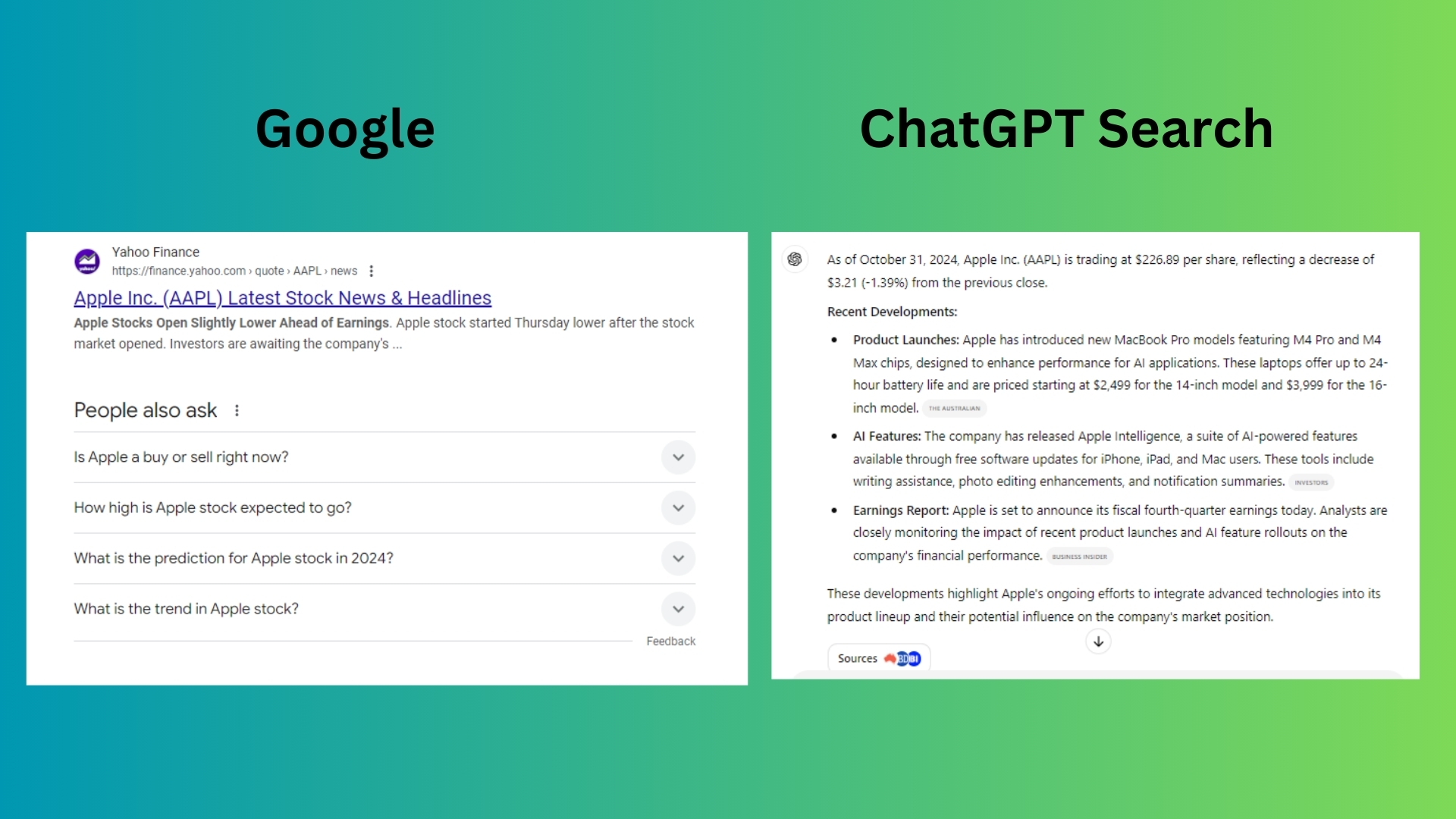
Prompt: What is Apple’s current stock price, and are there any recent news updates?
Google: Google didn’t actually give me an immediate answer. Instead, I got a link to Yahoo Finance where I could click around and hopefully find the answer myself.
ChatGPT: In milliseconds the answer was in front of my eyes. I also got news and updates about Apple with, of course, sources. ChatGPT Search is so refreshing. I’m getting answers to questions without digging around for details. I’m saving time by having the answer presented right before me without clicking a few more times. It is clear that for real-time stock or weather updates, ChatGPT offers comparable accuracy and even more depth despite Google’s vast database of visuals.
Winner: ChatGPT continues to impresses with its curated, real-time direct answers, showing promise for future updates.
4. Privacy and content responsibility
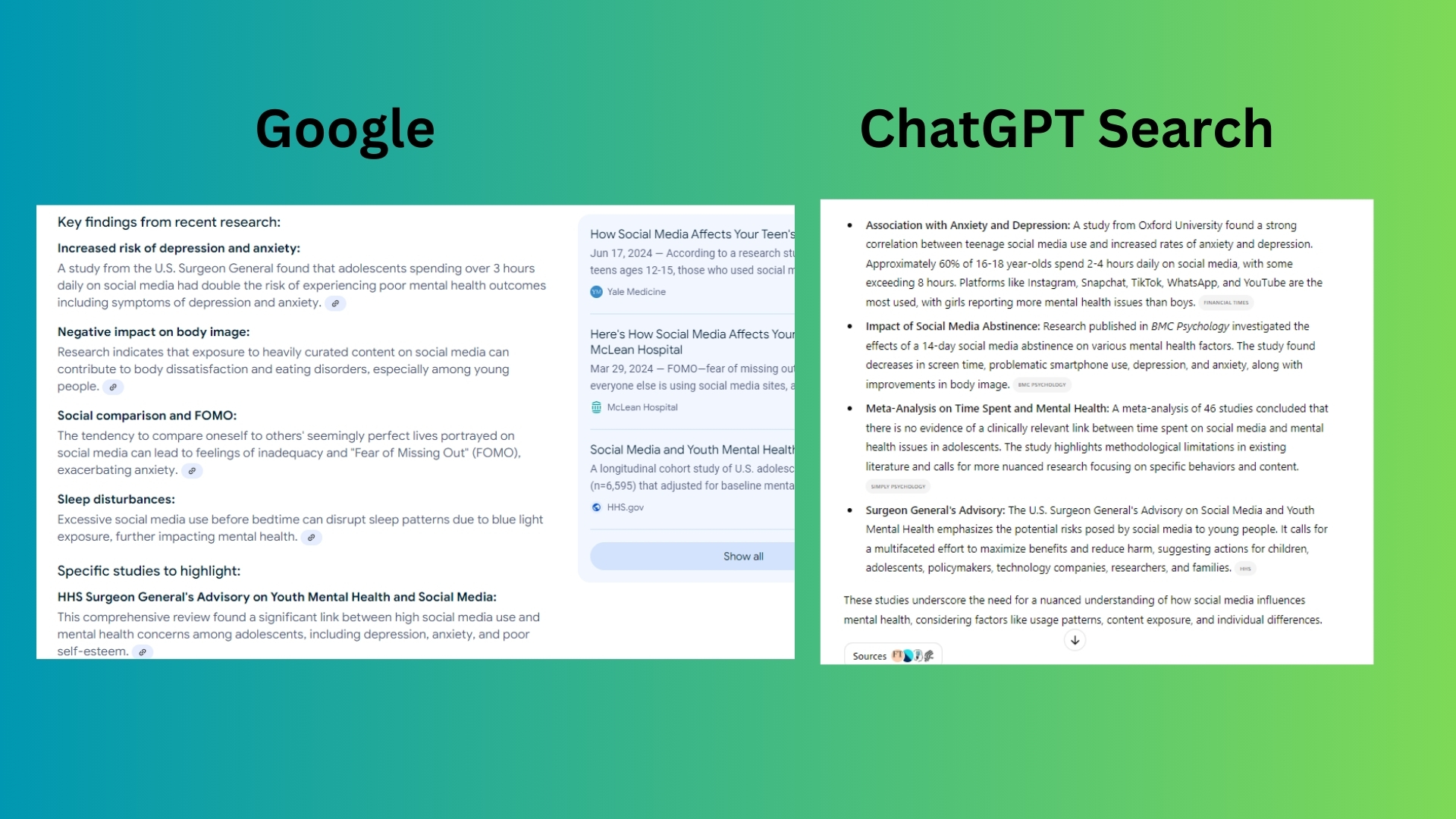
Prompt: Show me recent studies on mental health impacts of social media.
Google: Google offers so many different answers I’m not even sure where to look. From the Gemini response to the side bar to the link results below, the whole experience is extremely cluttered –something I’ve never noticed before using ChatGPT Search. Also, Google’s advertising model means user data is often leveraged to deliver personalized ads. While Google has extensive privacy policies and settings, its ad-driven approach can lead to targeted content that may not always prioritize user privacy.
ChatGPT: Wow. Once again ChatGPT search provides a cleaner interface without promoted content. For searches this personal, the extra privacy-focused approach is much appreciated. It is far more appealing to me as a user who wants information without being targeted by ads during the search — or after.
Winner: ChatGPT leads for an approach that takes privacy and responsible content use into account. When it comes to sensitive searches, not being targeted with ads is a huge bonus.
5. Overall user experience and accessibility
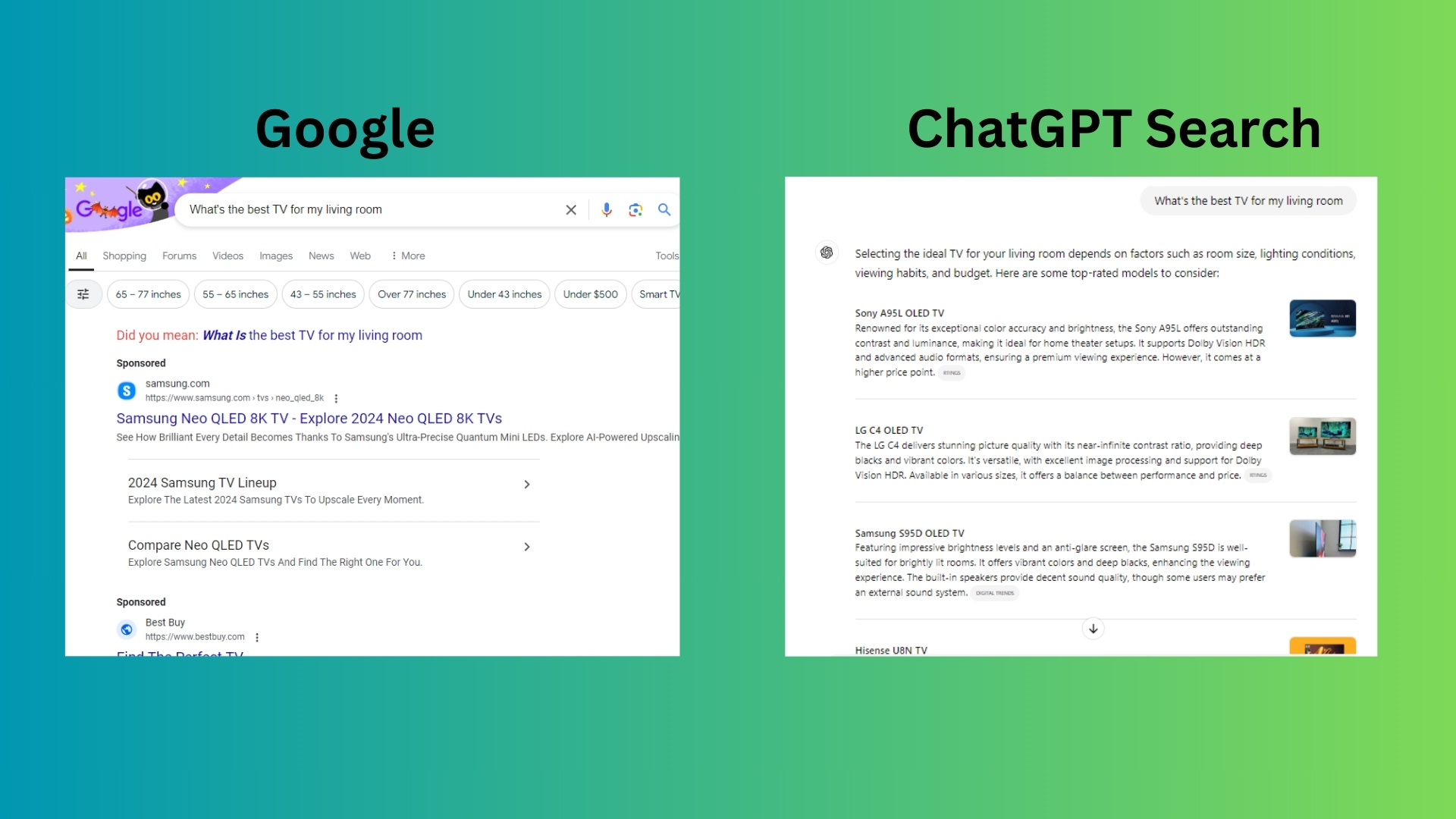
Prompt: What is the best TV for my living room?
Google: I said what I said, Google. After correcting me for typing “What’s” instead of “What is” Google responded with a few links, all of which were sponsored, for me to click through and find a TV. After getting this response, I feel as though I need to ask it again to help narrow it down. However, beneath the sponsored links there were links for content publishers like Tom’s Guide for its best TVs page.
ChatGPT: ChatGPT Search narrowed it down for me, included images, and gave me the answer I wanted. The AI really does feel like a friend offering up valuable information. Accompanying each TV image was a blurb offering information about each one. The design feels much cleaner and concise compared to Google. Plus, the conversational format is intuitive, so I can scroll through the recommendations without needing to dig through multiple links like I would need to do with a Google search.
Winner: ChatGPT offers a refreshing experience with direct answers and specific examples.
6. News stories in real-time
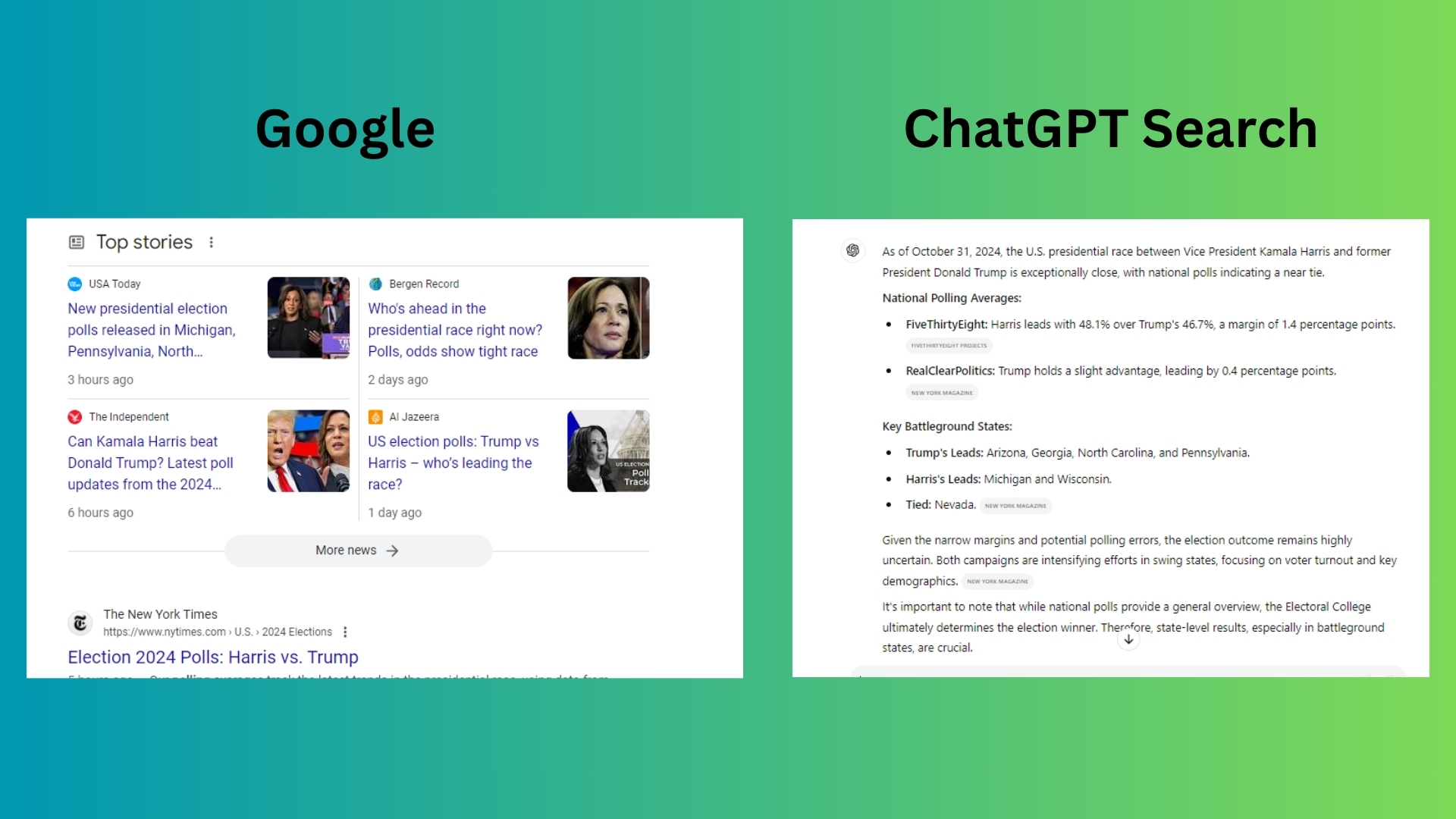
Prompt: Who is leading in the polls?
Google: The results from Google included news stories about the election. My hope with this question was to get no-nonsense, real-time results about who is leading today in the Presidential election polls. I would have had to dig through the news stories to get the answer.
ChatGPT: ChatGPT Search gave me the results exactly how I wanted them with just the facts. The election news is everywhere so I didn’t need to read more news stories. ChatGPT gave me a direct answer.
Winner: ChatGPT offers real-time answers without fuss.
7. Sports news and updates
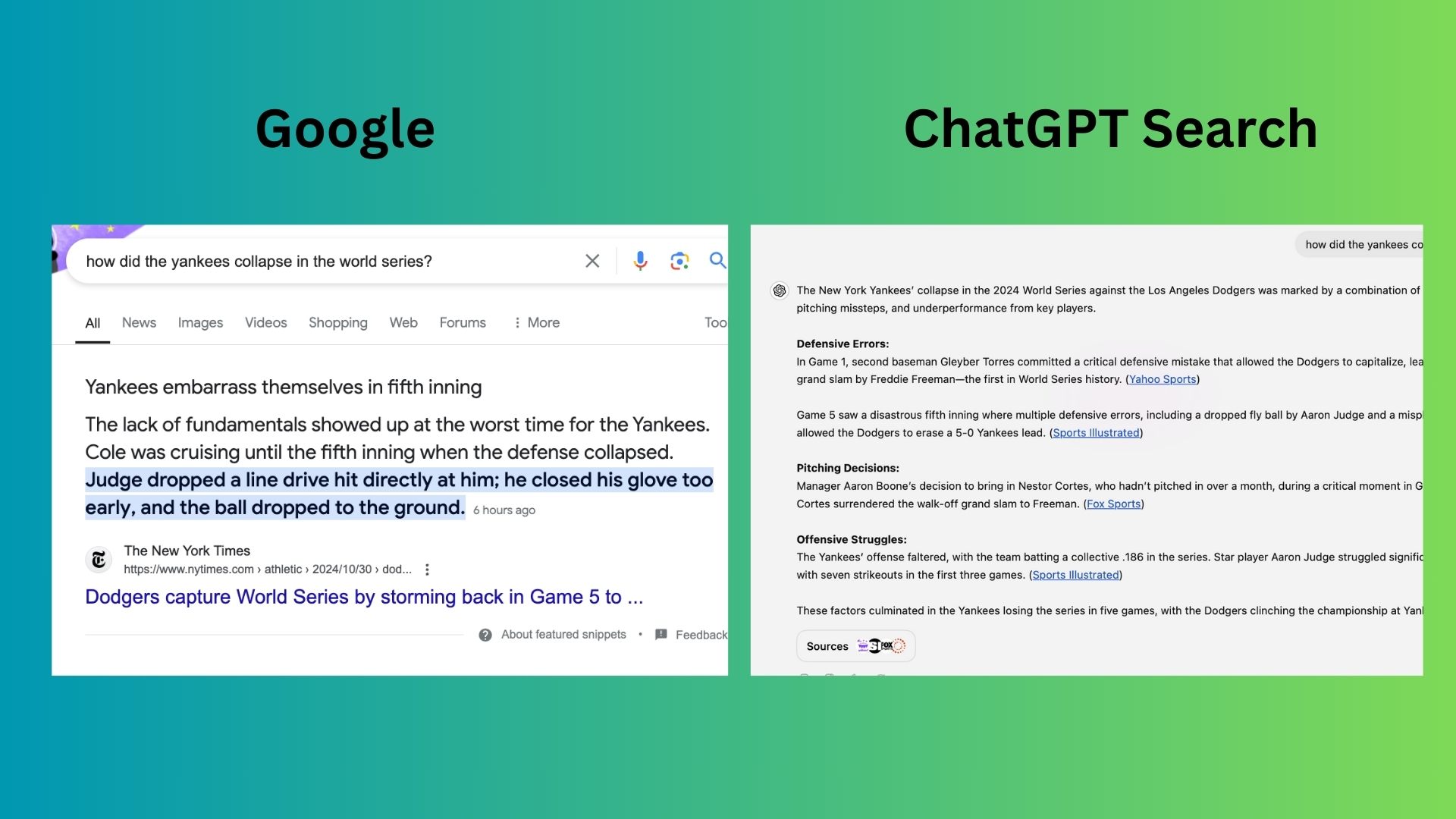
Prompt: How did the Yankees collapse in the World series?
Google: The first result from Google was a quote pulled from a New York Times story on the topic. This was a quick response and direct answer. Yet, it left me feeling like I didn’t have the whole story.
ChatGPT: ChatGPT Search gave a more thorough response with information pulled from more sources, yet still felt clean and concise. I got the complete picture of the Yanks’ utter failure.
Winner: ChatGPT again, offers real-time answers that I’m looking for plus adds the thoroughness that confirms I’m getting all the information.
Overall winner: ChatGPT Search
Both ChatGPT and Google excel in different areas, but they cater to slightly different needs. If you’re looking for comprehensive search results with a vast array of sources and visuals, Google is still the powerhouse. However, if your priority is clear, ad-free, conversational responses with built-in real-time updates, ChatGPT offers a streamlined, user-friendly experience that could easily become a staple for everyday queries.
The clutter-free answers from ChatGPT Search with sources to back them up are thorough and reliable. I feel more confident in the ChatGPT answers because they are so concise and without advertisers backing them. The results feel as though the results are just for me. In a cluttered web, ChatGPT feels like a helpful friend, and I like that.

